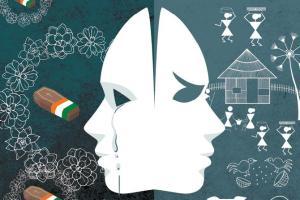People don't want to know how jawans live, because it interferes with the narrative, and compassion might force us to wonder about war and violenc

Illustration/Uday Mohite
 Each day brings more mention of hateful acts in the name of avenging the deaths of the CRPF jawans who lost their lives in Pulwama. The evacuation of Kashmiri students from hostels. A random explosion in the suburbs. A hotel sign saying 'Kashmiris not welcome'. Random gatherings of intoxicated men at our street corner saying they will go "up to the border", adding after a pause "if need be". But 'need be' never happens for any of those who insist on blood, does it? War has been a video game for people who do not actually fight in it long before video games were invented. This proxy violence finds new forms today.
Each day brings more mention of hateful acts in the name of avenging the deaths of the CRPF jawans who lost their lives in Pulwama. The evacuation of Kashmiri students from hostels. A random explosion in the suburbs. A hotel sign saying 'Kashmiris not welcome'. Random gatherings of intoxicated men at our street corner saying they will go "up to the border", adding after a pause "if need be". But 'need be' never happens for any of those who insist on blood, does it? War has been a video game for people who do not actually fight in it long before video games were invented. This proxy violence finds new forms today.
ADVERTISEMENT
Need is however a big part of why people join paramilitary services — economic need. (My father joined the Air Force when his father's death compelled him to give up on medical school. He also lost an eye in the 1965 war, but I never heard him speak vengeful words.) None among the militant patriots in my acquaintance — maybe there are others — want their children to become jawans. But let's not get personal. Let's assume they really care. It's just puzzling how this caring manifests when jawans die but is not much in evidence while jawans are serving their duty.
In 2017, Constable Tej Bahadur Yadav's video about the bad food given to BSF jawans and his claim that they often slept hungry went viral. No nationwide movement for the men who live a hard life, so we might live ensued. In fact, many doubted it — a cynicism that seems to go with this kind of violent patriotism. Yadav was sacked. When some months later, a jawan, Sindhav Jogidas Lakhubhai, posted videos about disparities in pay, food and pension between military and paramilitary, and abuse of the 'sahayak' system, he was dismissed as a habitual offender.
Social media access was restricted. The government launched a mobile app for jawans to lodge complaints. Less than 2 percent of CRPF personnel signed up for it, fearing a witch-hunt according to sources. Technology is neat na, full of solutions? Meanwhile, an analytical survey published in 2015, noted that only 42 percent of the children of CRPF jawans make it through matriculation and only 11.33 percent go for undergraduate studies, because of economic and emotional hardship.
People don't want to know how jawans live, because it interferes with the narrative, and compassion might force us to wonder about war and violence. They are attentive to jawans in death, terming them martyrs, much the way they valorise women who die of sexual or domestic violence as brave hearts, but disbelieve them when they are alive.
We are not equally attentive to others who die for our national ideals. For instance, we gotta be a Swachh Bharat as you know, but not a moment of pause about there being one manual scavenging death every five days, as per national data.
We say jawans died defending 'our land'. But have nothing to say about a Central government, which didn't bother to defend the Forest Rights Act and prevent a million adivasi Indian citizens from being evicted from their forest lands in a judgment last week. For these inconvenient truths and contradictions, for some lives and deaths of fellow Indians, not middle-class, but upper-caste, hyper-patriotic friends have no tears or social media updates. Don't know ki unka time kab ayega.
Paromita Vohra is an award-winning Mumbai-based filmmaker, writer and curator working with fiction and non-fiction. Reach her at www.parodevipictures.com
Catch up on all the latest Crime, National, International and Hatke news here. Also download the new mid-day Android and iOS apps to get latest updates
 Subscribe today by clicking the link and stay updated with the latest news!" Click here!
Subscribe today by clicking the link and stay updated with the latest news!" Click here!






